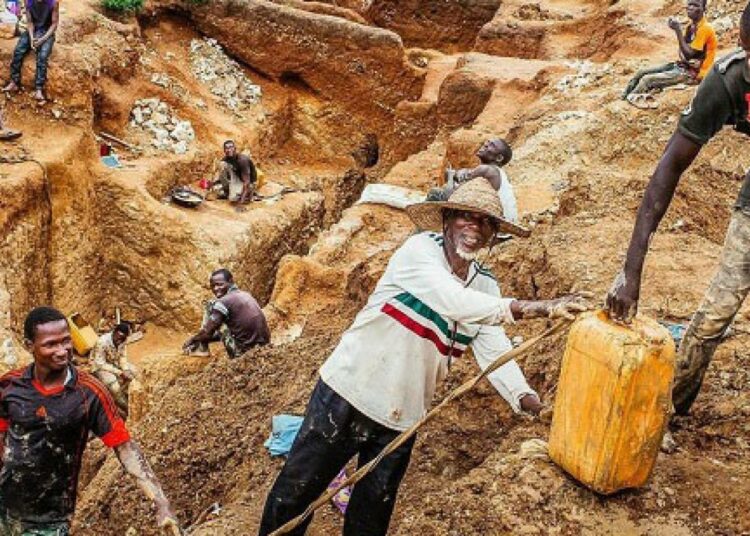Due to Nigeria’s dire economic situation, the President Bola Tinubu administration has been trying to diversify Nigeria’s income stream away from over reliance on oil revenue to other non-oil sources. And one major area it has earmarked in this belated drive is solid minerals, which Nigeria in stupendously blessed with, but from which it is getting scant income due, largely, to a combination of lack of government attention in developing the sector, and the activities of illegal operators. The minister of solid minerals development, Dr Oladele Alake, has declared at various fora that solid minerals is Nigeria’s next oil, a metaphor for the country’s major income earner in the foreseeable future.
Nigeria is home to over 40 solid minerals in commercial quantity. In fact, all the 36 states of the federation and Abuja, the capital city, are blessed with at least one or more of such minerals. Some of the notable ones include gold, diamond, lead, zinc, iron ore, coal, topaz, bitumen, marble, granite, talc, bauxite, tantalite, uranium, gemstones, feldspar, gypsum, barite, dolomite and Kaolin. Nigeria is also blessed with the some of the minerals in high demand because of their importance in the quest for energy transition, like lithium, cobalt, copper and manganese, among others.
However, the attention to oil and lack of political will to rein in illegal operators had meant that Nigeria has not been accessing the necessary income from the exploitation of these mineral resources. But all this is set to change in the present dispensation with the federal government, in its first year in office, showing the necessary political will to sanitise operations in the industry and mainstream the industry in the country’s economic matrix.
To show its resolve, in November last year, the federal government revoked a total of 1633 mineral titles over their failure to pay annual service charges. This followed after the expiration of a 30-day notice to defaulters as stipulated by sections 11 and 12 of the Nigerian Mineral Mining Act (NMMA), 2007.
And in April this year, to crack down on licence racketeering, the federal government revoked another 924 mining licences for being dormant. It did so to shut out speculators who were in the practice of obtaining mineral titles at cheap government rates and reselling to investors at extortionary prices, which defeats the government’s ease of doing business efforts as well as discouraging genuine investors.
However, in order not to close down genuine business investments over small infractions, the federal government has offered both sets of defaulters a 30-day window to make retribution by paying fines ranging from N2.5 million to N10 million in order for them to regain their titles and resume operations.
Also, as result of the ministry’s strict sanitising process, many artisanal miners have aggregated into 152 cooperatives which make their activities manageable. Sadly, the elephant in the room is illegal mining, and the federal government has declared that it is not willing to give any quarter to the criminals. And it has good reason not to, for according to Economic Community of West African States (ECOWAS), Nigeria loses a whopping 91 percent of its mining revenue to illegal mining.
The speaker of ECOWAS Parliament, Mohamed Tunis, at the opening of a three-day seminar organised by the Parliament on “Illegal mining and its implications in the ECOWAS Region” recently, stated that a staggering 80 per cent of mining in the country’s northwest region is conducted illegally, costing the nation 91 per cent of potential mining revenue.
On its part, the Nigeria Extractive Industry Transparency Initiative (NEITI) estimates that Nigeria loses between $2 billion and $3 billion to illegal mining yearly.
In August last year, a senior advocate of Nigeria (SAN), Femi Falana, in a television interview claimed that about $9 billion worth of gold is illegally extracted from Nigeria annually, often transported through private jets. He said he relied on information from Uche Ogah, former minister of state for mines and steel development. Whichever is the correct figure, the distressing point is that illegal operators are fleecing Nigeria of billions of dollars every year in the mining industry, the same way they are fleecing Nigeria in the oil industry.
Last year, Alake declared that some powerful Nigerians were the perpetrators of illegal mining and gave them an ultimatum to quit or face the consequences.
Subsequently, the government set up an inter-agency committee including the ministry of solid minerals and the security agencies that birthed a 2,220-strong specially trained Mining Marshals made up of personnel of the Nigeria Security and Civil Defence Corps (NSCDC) to secure the mining environment and contain the menace of illegal miners in in the country, with 60 personnel deployed per state. However, that is just the initial force. Plans are afoot to increase the number both in size and makeup, with the personnel from other security forces to be integrated into the unit, towards waging a total battle against people, Nigerians and foreigners as well, stealing minerals from Nigerian soil.
At a recent mining summit organised by the country’s apex think tank, Nigerian Institute for Policy and Strategic Studies (NIPSSS), Alake reported that Mining Marshalls were already making arrests in parts of the country and that more and more mining firms are requesting their deployment.
The minister, who declared recently that Nigeria was working to become a global mining destination, said the government was ready to remove any obstacles to achieving it.
This is a good fighting talk, and as a newspaper, we urge him and his team to sustain the tempo of tackling crooks in the sector, no matter their status in society. If they do the needful, Nigeria will soon become known for its solid minerals wealth as it is for its oil.









